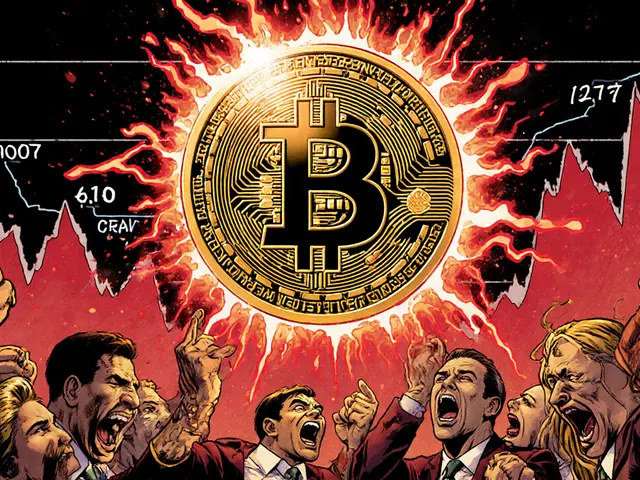Why Singapore Is Asia’s Leading Crypto Hub
Crypto Tax Savings Calculator
Singapore Crypto Tax Savings Calculator
Compare your potential tax savings by trading in Singapore's tax-friendly environment versus other jurisdictions
Your Potential Savings
Enter your trading volume and jurisdiction to see your savings
Singapore has quietly become the powerhouse of digital assets in Asia, drawing in startups, banks, and global institutions alike. If you’ve ever wondered why the city‑state gets the most buzz at crypto conferences, the answer lies in a mix of clear regulation, massive market flow, and a tax‑friendly climate that together create a fertile ground for innovation.
Global Rankings Place Singapore at the Top of the Crypto Map
According to the Crypto‑Friendly Cities Index2025, Singapore sits fourth worldwide, trailing only Ljubljana, Hong Kong and Zurich. Meanwhile, the ApeX Protocol report gave the nation a flawless composite score of 100, naming it the most “crypto‑obsessed” country on the planet. Those two numbers capture the same reality from different angles: external analysts see Singapore’s ecosystem as thriving, while insiders recognize the nation’s all‑in‑one approach to policy, infrastructure and talent.
Regulatory Landscape: MAS Sets the Gold Standard
Monetary Authority of Singapore is the sovereign regulator that has crafted one of the world’s most balanced digital‑asset frameworks. By distinguishing payment tokens, security tokens and utility tokens, MAS offers clear licensing pathways for each category. Companies that obtain a Payment Services licence can operate payment‑token services, while the new Digital Asset Custody licence sets strict capital and AML requirements, giving institutional investors confidence that their assets are protected.
The impact is measurable: 83% of Fortune500 blockchain pilots now run under MAS‑approved frameworks, a figure that reflects the regulator’s predictability. The June302025 deadline that forced unlicensed firms to shut down caused a short‑term liquidity shift, but also cleared the field for compliant players, sharpening the market’s overall quality.
Market Activity: Stablecoins Lead the Charge
Singapore is the world’s second‑largest stablecoin hub behind the United States. Circle reported that between June2024 and June2025, Asian‑Pacific on‑chain stablecoin activity hit $2.4trillion, with Singapore acting as the primary conduit for cross‑border flows. The Singapore‑China corridor now handles the most active stablecoin route globally, moving billions daily for trade, remittances and B2B settlements.
Corporate use exploded from under $100million in early2023 to more than $3billion by early2025. Companies ranging from travel agency Wetrip to luxury retailer GinzaXiaoma accept stablecoins for payments, showcasing real‑world demand. This surge is tied directly to the city‑state’s supportive banking ecosystem, which now offers dedicated stablecoin accounts and faster settlement windows.

Tax and Business Environment: The Sweet Spot for Crypto Entrepreneurs
One of the biggest draws is Singapore’s tax‑friendly stance: there are no capital gains taxes on crypto trading, no income tax on staking rewards, and no tax on mining profits for individuals. This clear fiscal policy removes a layer of complexity that many other jurisdictions still wrestle with.
Coupled with the regulatory certainty, the tax regime has attracted high‑profile executives. Crypto.com is a global crypto platform whose founders Gary Or, Bobby Bao and Rafael Melo moved their headquarters to Singapore in 2024, citing the “predictable legal environment and attractive tax framework.” Even Binance co‑founder Changpeng Zhao has a significant operational footprint in the city‑state.
Institutional Adoption: Big Money Finds a Safe Harbor
BlackRock is the world’s largest asset manager, which designated Singapore as its Asian tokenization hub in 2025. The decision signals that the world’s most cautious investors see Singapore as a low‑risk, high‑potential venue for tokenizing real‑world assets.
Meanwhile, Circle the issuer of USDC stablecoin, opened a Singapore office in May2025, reinforcing the city‑state’s role in the stablecoin supply chain. SWIFT is also testing CBDC bridges with Singaporean banks, indicating the nation’s central banks are ready for the next wave of digital money.
Community and Events: TOKEN2049 Puts Singapore on the Global Stage
The annual TOKEN2049 conference, which launched on October12025, gathered 25,000 attendees from over 160 countries at Marina Bay Sands. With 500+ exhibitors and 300+ speakers, the event sold out in days, underscoring Singapore’s reputation as the go‑to meeting place for crypto leaders. Sponsors such as OKX, Coinbase and TRON chose Singapore as their showcase, reinforcing the narrative that the city‑state is the epicenter of crypto conversation in Asia.
Beyond the conference, a thriving ecosystem of incubators, venture funds and academic programs supports continuous talent flow. Universities now offer dedicated blockchain courses, while accelerators like SkyVentures provide seed capital to early‑stage projects, ensuring a pipeline of innovation that keeps the hub humming.

Comparative Snapshot: How Singapore Stacks Up Against Other Crypto Hubs
| Hub | Global Ranking | Stablecoin Volume (US$bn) | Regulatory Score (out of 100) | Tax Friendliness |
|---|---|---|---|---|
| Singapore | 4 | 2,400 | 95 | Very High |
| United States | 1 | 2,800 | 70 | Medium |
| Hong Kong | 2 | 1,900 | 85 | High |
| Zurich | 3 | 1,200 | 90 | High |
While the United States still leads on raw volume, Singapore’s regulatory score and tax friendliness give it a competitive edge for long‑term, sustainable growth. The city‑state’s approach attracts institutions that value predictability over sheer market size.
Risks and Future Outlook: What Could Shift the Landscape?
Even a thriving hub faces headwinds. Potential regulatory tightening-especially around privacy‑coins or high‑frequency trading-could raise compliance costs. Moreover, competition from emerging hubs like Dubai’s “Crypto City” or Switzerland’s Zug may lure talent and capital if they offer comparable incentives.
Nevertheless, forecasts predict that tokenized real‑world assets could unlock up to $2trillion by 2030, with Singapore positioned as a testing ground. The government’s “Smart Nation” agenda continues to fund blockchain pilots, and the younger, crypto‑savvy demographic (Millennials and GenZ) is three times more likely to use digital assets than older cohorts, ensuring demand stays robust.
Key Takeaways
- Singapore consistently ranks among the top three global crypto hubs, thanks to a balanced regulatory framework and tax incentives.
- MAS’s clear licensing pathways have attracted 83% of Fortune500 blockchain pilots, establishing strong institutional confidence.
- Stablecoin activity in Singapore accounts for a large share of Asia‑Pacific on‑chain volume, with the Singapore‑China corridor leading cross‑border flows.
- Major players like BlackRock, Circle and Crypto.com have set up regional bases, reinforcing the hub’s credibility.
- Events such as TOKEN2049 showcase Singapore’s status as the premier gathering place for crypto innovators in Asia.
The combination of Singapore crypto hub attributes-regulatory clarity, tax friendliness, and a vibrant ecosystem-makes the city‑state a compelling destination for anyone looking to build, invest or expand in the digital‑asset world.
Frequently Asked Questions
Is cryptocurrency trading taxed in Singapore?
No. Singapore does not levy capital gains tax on crypto trading profits, nor does it tax staking or mining rewards for individuals. Companies may have corporate tax obligations on crypto‑related income, but the overall regime is considered very friendly.
What licences does MAS require for a crypto exchange?
A crypto exchange that offers payment‑token services must obtain a Payment Services licence under the Payment Services Act. If the platform also provides custodial services, a separate Digital Asset Custody licence is required.
How does Singapore compare to the United States for stablecoin operations?
The U.S. processes a higher total stablecoin volume, but Singapore offers a clearer regulatory framework and a zero‑tax approach for individuals, making it more attractive for businesses seeking certainty and lower operational costs.
Will Singapore’s regulations become stricter in the near future?
MAS continually updates its guidelines to address emerging risks, but its core philosophy of balancing innovation with consumer protection is expected to remain. Any tightening will likely focus on high‑risk activities like privacy‑coins rather than on general token services.
What opportunities exist for startups in Singapore’s crypto ecosystem?
Startups can tap into government grants for blockchain pilots, access a pool of crypto‑savvy talent, and benefit from partnerships with banks that already support stablecoin accounts. Areas like tokenized real‑estate, decentralized finance platforms, and crypto‑first public services are especially hot.








Singapore's crypto-friendly policies really stand out, especially when you compare the low tax burden and clear regulatory guidance with what we see back in the US. The government's proactive stance helps nurture innovation while keeping everyday traders safe.
I completely agree with the points above. It's great to see a place that balances growth and protection, and I think many of us could learn from Singapore's approach. Even though the article was a bit dense, the overall message really resonated with me. Sorry if I typo a bit, defintely love the vibe here.
While Singapore touts itself as a crypto haven, one must question whether its lax stance on taxation simply masks deeper regulatory gaps. The absence of stringent oversight could invite speculative bubbles, and history shows that unchecked markets tend to implode. Moreover, the claim of "clear" rules often ignores the nuanced ambiguities that only seasoned practitioners notice.
Singapore really nails it! 🚀
The article highlights Singapore's tax advantages, which are indeed compelling. However, I am curious about the long‑term sustainability of such policies, especially as global tax frameworks evolve. Will the jurisdiction maintain its competitive edge, or will other regions catch up?
Sure, Singapore looks great on paper, but let’s not forget that rapid growth often leads to over‑hyped expectations. Its "friendly" environment could easily become a double‑edged sword if regulatory oversight lags behind market innovations. Reallly, without solid foundations, any hub can crumble under pressure.
From a philosophical standpoint, the balance between freedom and responsibility is crucial. Singapore’s model, while seemingly efficient, must continuously reassess its ethical commitments to users, lest it sacrifice fairness for speed.
It is evident that Singapore's regulatory framework provides a level of certainty that is rare in other jurisdictions. However, the trade‑off is that some flexibility may be lost, and stakeholders must adapt accordingly.
I see your point about certainty, but i think a little more flexibility could encourage even more innovation. Collaboration between regulators and developers is key.
Singapore's regulatory framework offers a clarity that many Western jurisdictions still lack. The MAS has positioned itself as a technology-friendly supervisor, which encourages innovation. Unlike the United States, where the IRS treats every token as property, Singapore classifies most digital assets as non-taxable. This distinction dramatically reduces the compliance burden for traders. Moreover, the lack of capital gains tax means that long‑term investors can hold positions without fearing a hidden levy. The city‑state also benefits from a strategic geographic location, serving as a bridge between East and West. Its robust digital infrastructure supports high‑frequency trading platforms with low latency. The government actively funds blockchain research through grants and incubators. As a result, homegrown startups can scale quickly and attract global talent. The legal certainty provided by clear anti‑money‑laundering guidelines further boosts confidence. For multinational firms, the ease of setting up a subsidiary in Singapore simplifies cross‑border operations. The tax‑friendly environment also attracts venture capital, which fuels ecosystem growth. Investors from the US often cite Singapore as a safe harbor for crypto assets. While no jurisdiction is perfect, the balanced approach here minimizes both risk and cost. Therefore, it is unsurprising that Singapore has become Asia's leading crypto hub.
That thorough breakdown really underscores why Singapore shines in the crypto space 😊. The points about regulatory clarity and tax benefits hit home, especially for those of us navigating multiple jurisdictions.
Singapore's model is impressive, but American investors should remain vigilant about compliance and reporting requirements.
Only those who lack true insight would overlook Singapore's strategic advantage.
While one might argue that such perspectives reflect a certain elitism, it remains essential to examine the broader implications for global finance.